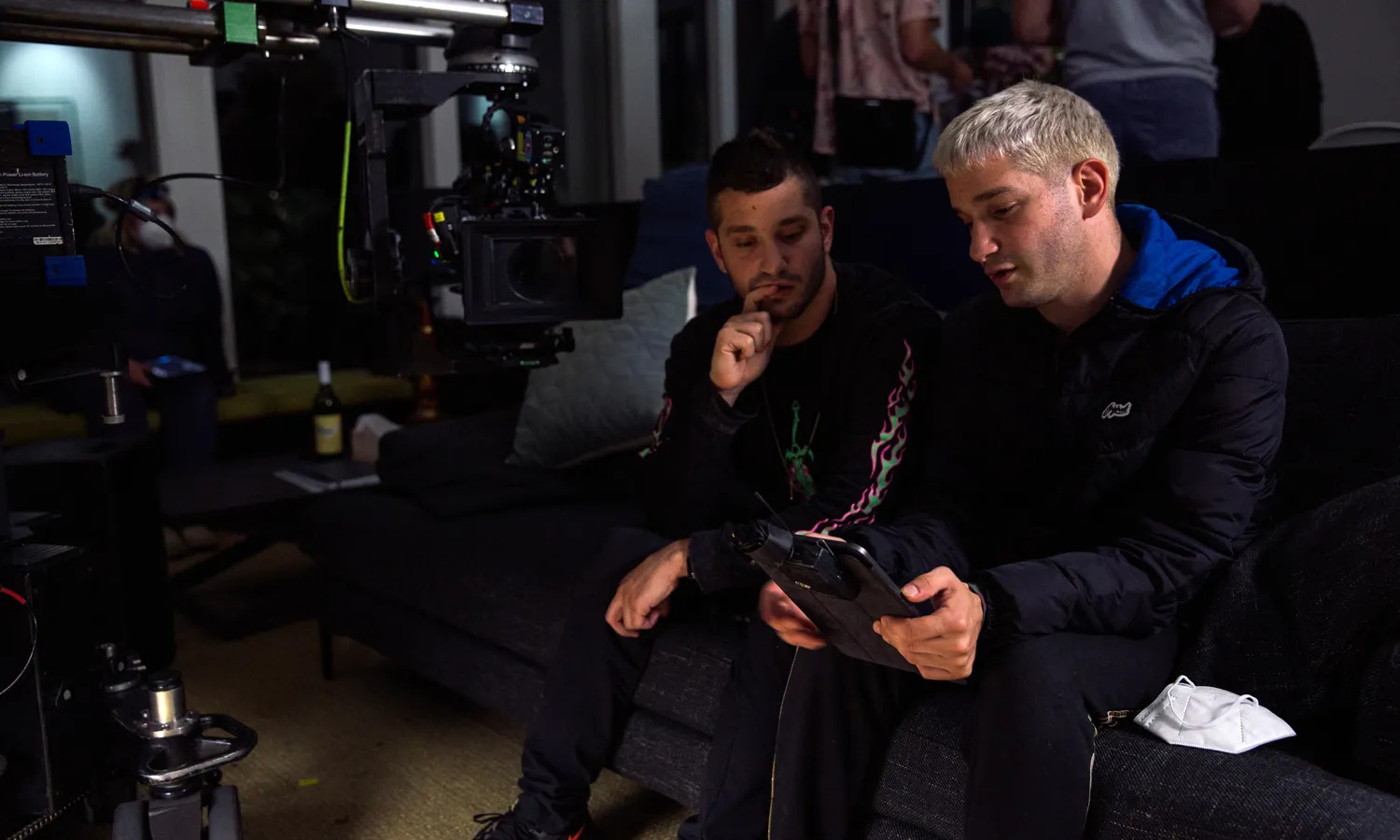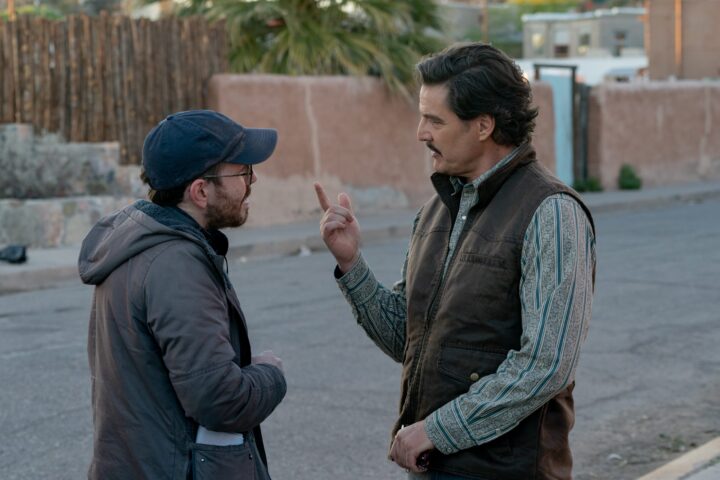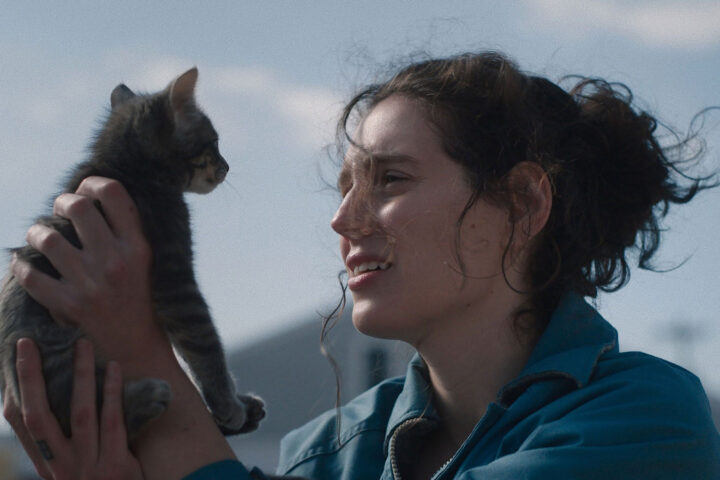Sitting across from the dynamic twin brothers Danny and Michael Philippou, as I am this morning at the famed The Peninsula Chicago, is an exhilarating trip. With the arrival of their terrific debut picture, Talk to Me, the wildly energetic, inventive duo have graduated from award-winning shorts and the phenomenal success of their Racka Racka YouTube channel to bona fide feature filmmakers. Undoubtedly, the thirty-year-old brothers have every reason to be thrilled about this moment, their passion palpable in their rapid speech, super enthusiastic demeanor and genial engagement.
Talk to Me, a dramatic, altogether compelling new horror picture about Gen Z supernatural possession, is smart, involving and frequently shocking. The film takes its time building a complex young character named Mia, played in a star-making turn by twenty-five-year-old Australian actress Sophie Wilde, grieving a family loss while ensnared in a very dangerous game. That game, which involves a nightly friend group ritual of conjuring up the undead by communing with a disembodied, mysterious hand with the power to bring malevolent spirits into our world, goes wickedly wrong. The picture is absorbing and terrifying in an economical 95 minutes, the brothers sharply balancing pathos and fright to deliver a fresh take on the notion of a conjuring, which in 2023 is, of course, a live streamed seance in all its gory glory.
Lee Shoquist: What really got me in Talk to Me was how it operates on multiple levels. To begin with, we have a psychological thriller. We also have a visceral, supernatural thriller. It is also a drama and takes that seriously. It also has a mystery. Equal weight is given to these things. In many horror films you don’t care about the horror unless you care about the people, and we do here. Can you speak a bit about writing that?
Danny Philippou: Yeah! Having our horror based in reality and having those characters feel like real people was always a big goal for us. One of my favorite television shows ever is In Treatment, which is just a therapist talking with patients; even throwing water on another character carries so much weight because everyone feels so real. So I knew that I wanted to write characters that fully felt like fleshed out people. Bong Joon-Ho’s Memories of Murder, and the way he merged genres, was an approach that we wanted to work. We wanted a drama film as well as a horror film because when things do go wrong you feel so much more because you empathize and like these characters. I felt that for the first time really when I watched Memories of Murder. I felt even though these characters could be seen as pieces of shit, I empathized with them and found them very funny. So when it took that really dark turn I was really with it. It’s just the best experience when you care about the character.
It takes a while for you to take that dark turn here. There is good fun in the first part of the film and then you build that exciting sequence that is so much fun to watch.
DP: That montage! Yeah!
And it takes a little while for that very serious thing to happen. Talk a little bit about that montage sequence you just mentioned. I think you did a full 60 setups while shooting that sequence.
DP: Yeah! So we had fifty shots that we wanted to get, and our assistant director told us that it was mathematically impossible because we only had two hours to shoot it. We were wrapping out of that location! But we said, ‘Just let us control the set for the next two hours.’ Thank God for our YouTube background, which helped us to be able to implement that. We had two cameras and a boom box, and we were playing music and riffing, and we got all of those shots and a bunch of improv and, I think, that energy of, ‘Move! Move! Move! Mic checks! We’re good!’ We were able to really, really move. Thank God the camera guys could keep up. And a big shout out to our focus puller, Charlie!
Did you guys ever stop shooting during that time?
Michael Philippou: It was shooting that whole time pretty much! It was literally chaos!
DP: Our producer pulled us to the side and said, ‘This is not the way to run a film set.’ But we actually got so much amazing footage that if we had done the proper setup and had three days to shoot that sequence, you would not feel the same way about it. I feel like you would have lost some of the energy of that process with proper setups.
Why this movie for your first feature?
DP: It was the first one that just gained momentum that I felt so passionately about, even with our producer and stuff. When it caught momentum, I was able to cannibalize different projects we’d had and take different elements and characters and put them into one ultimate script. It just felt right. That is why the second film is going to be shit!
You guys spent years preparing before you made a full-length feature. You were playing, honing, experimenting, working as you mentioned on YouTube. How much of that was instrumental in preparing you to direct a feature?
DP: It was so pivotal, just to sharpen your skills in so many different departments and even to work on crew on set, which we did, having that experience in the lighting department or grip department or sound department. Having all of that background just helps you understand where different crew members are coming from and knowing how to solve problems when they start coming up, because obviously there are going to be a lot of problems that come up on set. We were constantly brainstorming and problem solving.
MP: I think having our experience of being on sets, even before the YouTube stuff, was great because then we understood what we were getting ourselves into. And Screen Australia helped to fund things for us where we would work and control a proper crew for the first time, and then they funded a different thing where we did a longer form, narrative piece. They helped guide us into doing a feature as well, which was so helpful.
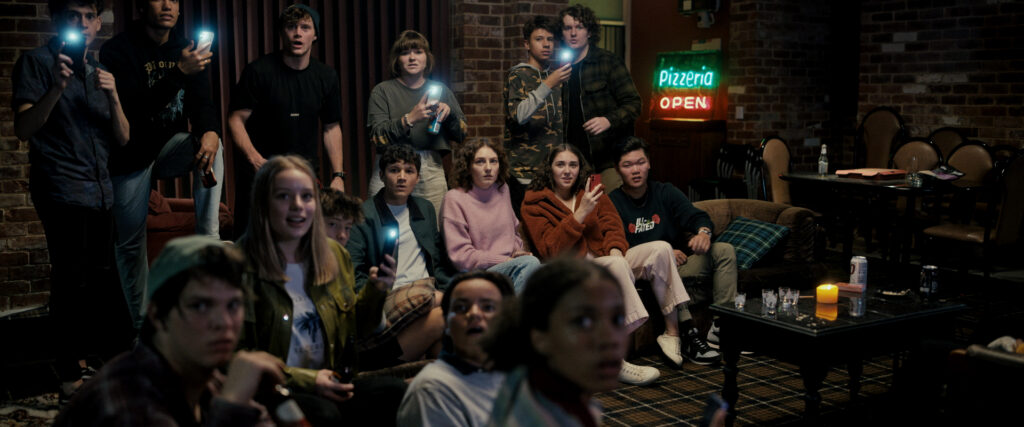
What was different that you learned doing a feature than everything you’ve done before?
DP: The biggest difference is that there are so many more people involved and things move a lot slower. So if we wanted to film at a train station for YouTube, we would take a camera and just go shoot there. If you do that on a film you would need permission, roads need to be shut down, there needs to be traffic control and the trains needed to know when to come. It is such a massive, moving piece; even setting up a unit means there are 15 trucks on some road.
MP: But also, it was a big weight off our shoulders because there are all of these amazing heads of departments that were bringing their specialties to set; things we could never accomplish just doing it by ourselves. So our production designer, Bethany Ryan, and our cinematographer, Aaron McLiskey, were achieving things we could not possibly achieve on our own.
DP: It was like a weight off. We learned to try and do so much ourselves. We had people that were dedicated to certain aspects of the form who were specifically focused on them. And then we could just focus on the overall creative direction. It was so great to collaborate with such talented artists.
Speaking of, could you share a bit about Sophie Wilde, your remarkable lead actress?
DP: Oh my God! We just knew straight away from her audition that we wanted her, and there was a bit of pushback- well, not pushback, but she was not a name, so she was a bit difficult to cast. We lost a million out of the budget in casting her, but we wanted her so badly because her performance in her auditions was so incredible. So we and our producer invested our fees back in (to the film) and did whatever we could to make that budget back up and then we got her. We just think she’s going to be a star. We don’t think, we know. She is a star! You don’t know it yet. Anything we had to give up getting her we were happy to do. She is unbelievable in every single take. She is the most inspiring and beautiful person. She is so committed. There were days when we asked her not to go to sleep and to come to the set having not slept, and she was committed like that! She did that. She was such a physical performer, and she was just incredible.
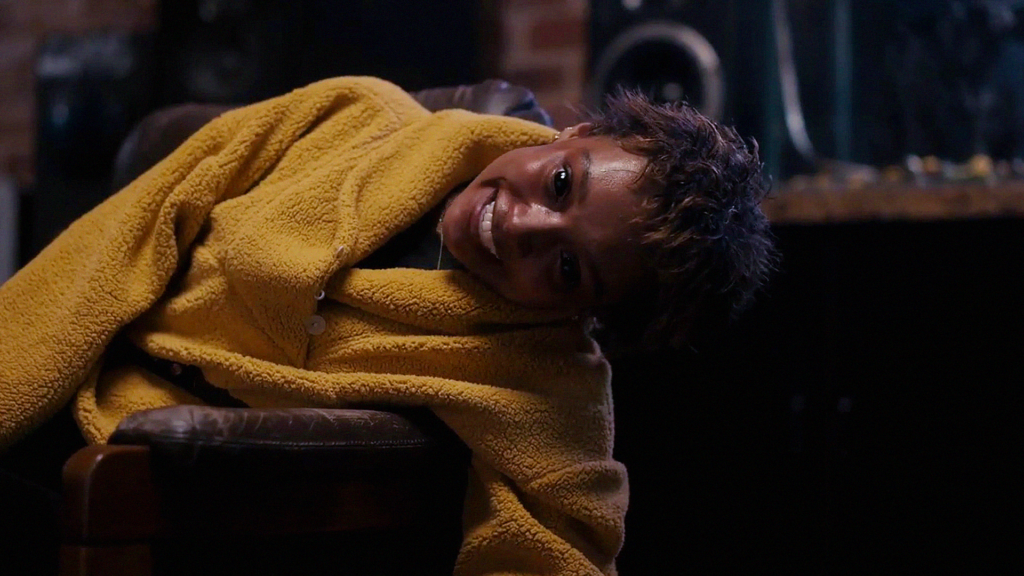
I understand that she initially wanted the role of Hayley, is that right?
DP: Well, that was the first audition that she had sent in. We had already cast Zoe as Hayley because we love Zoe Terakes…
Who is great!
DP: I know! I said to our producer that if Zoe was not available I did not want to start production yet! I could not imagine anyone else in that role. So Sophie had done an audition for Hayley, and then we did a test for Mia, for which she was just perfect.
Did she grasp what we talked about earlier—that there was a character drama at the center of this? She certainly plays it effectively. How did you direct that part of that?
DP: That was really part of that rehearsal process—to sit down and break out every single line; every beat. We would just go through and discuss the scenes, the dialogue and even changing the words for the actors so that they would sound more natural. It was a big part of the process to make the characters feel as authentic to the actors as possible, even allowing the actors to have a say about what their character was going to wear; things like that. We were super collaborative with them in terms of how they wanted to develop. Speaking of Sophie, because she was one of the last to be cast, we had her read against all of the other actors to see how she was gelling, and she would nail every single time. I was like, ‘How is Sophie bringing this amazing energy to every single one?!’
I would imagine she especially brought it in those scenes with your young actor, Joe Bird, as when she picks him up in the car at the beginning and also when he comes to lie down next to her on the sofa to sleep. Those are very important set-up scenes for the second half of the movie. In the first half like we are tracking with this relationship and wondering where it is going to go. The substance between the two of them was perfect. Tell me a bit about Joe, because he is a very special young actor.
DP: Dude, we found him so late in the process. In rehearsals, a lot of kids were nailing the drama elements but none of them were really going there for the possession. Then Joe came and sat opposite us, doing this full possession right in front of us! It is on my phone! I thought, ‘Holy hell!’ I just could not believe how good his performance was. He was willing to go there. There was a scene where he has to get really emotional, and he is crying. When you are shooting a scene like that it is not just one take. We had to be there for three hours doing that, and he had to be in that high emotional state for the full three hours. Because he got himself into such a dark place it took him a long time to come out of it. He is a super kid and very talented, and we would love to work with him again.
MP: And he is just game for everything!
DP: And the make-up! So many hours of makeup.
MP: I think having the rehearsal process with the Sophie and Joe was pivotal.
DP: But also, there were a bunch of additional scenes in the original cut, which went 20 minutes longer; a lot more of character work in there. When you see the film, I feel like you can feel that they have all of that history that came from those scenes that we shot and ended up removing. But through the rehearsal process we played with three scenes that we knew were never going to be in the movie. We had them live out those moments in the characters’ lives so that they could have that experience.
MP: Yes, and even shooting that cast scene near the end of the film when there was that bond. We all joked together, because we had been friends for so long on the set. Being able to shoot that scene together just felt so natural.
Whose idea was it to dig out the eyeball?
DP: (Laughter; pointing) Yeah! It was so important for us to do that practically, so we built his face on top of his face. The makeup and the amazing prosthetic department were so incredible in bringing that to life.
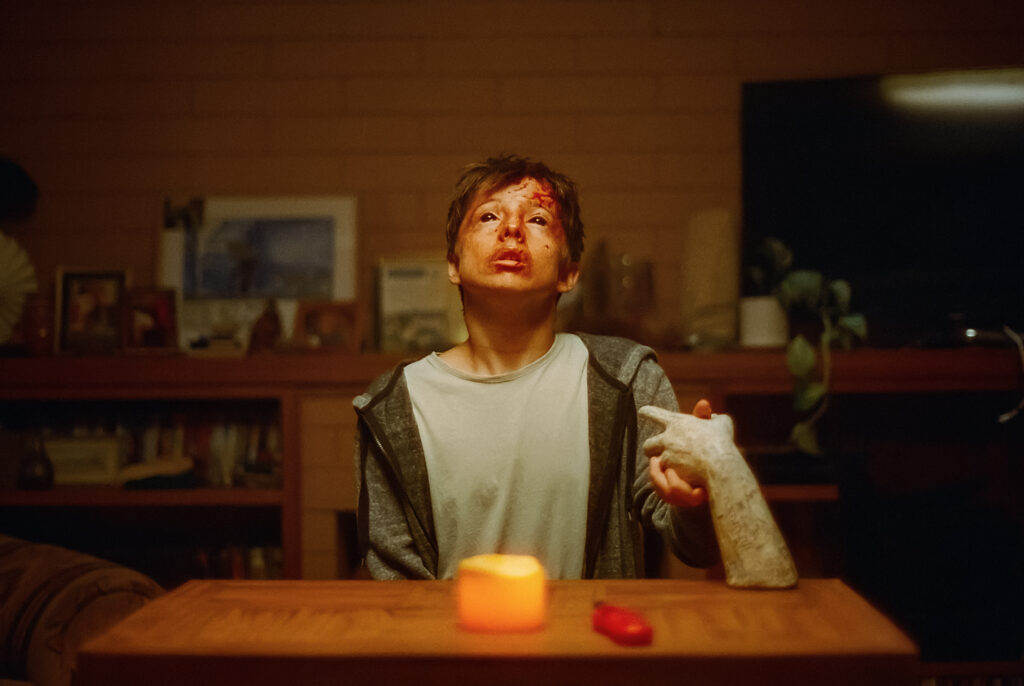
You know something is working as a horror film when something like that sequence comes up and you hear the reactions from people. When I saw the movie it was a surprise screening for the audience, so almost everyone in attendance did not know what they were about to witness. Horror films typically draw a particular audience that is a fan of such things, but the average audience is not. Horror film audiences want that type of experience but surprise audiences that show up really have no idea.
DP: (Laughter) That’s crazy!
From the reaction in the theater, I could feel that the movie was really working.
MP: People have fainted from that scene!
DP: Last night with an audience we were watching from the top and looking down (at the audience). It is the most amazing experience when it’s working and everyone is laughing at the comedy bits and then shrieking at the horror bits! It is such a communal thing going on with a horror film, reacting together in an audience. You may be strangers but you are there together experiencing, and that is so amazing.
It is like a comedy. Both horror films and comedies change your physiology and produce that type of reaction. A lot of films cannot do that. These films have built-in anchors in them. It’s a bit different if you’re talking about a drama.
DP: Yes, dramas are a bit more terrifying because you are sitting there wondering what are they thinking.
Are you guys horror film fans?
DP: Yes, of course! It was the first genre I fell in love with from R.L. Stine’s Goosebumps works. My mom was so specific about what we could and couldn’t watch, so that whole thing of watching an R-rated film for the first time and experiencing something you’re not allowed to watch is such a part of childhood.
The absolute best. I grew up in the slasher era, so my genre was 1977 to 1983 horror films at the local drive-in. I had the same exact experience as you with the R-rated movies and it felt like a huge deal to be able to see one if you could.
DP: Yeah! Oh!
Yes, just amazing—Fulci, Argento, D’Amato and so many others!
DP: Friday the 13th?
LS: Yes! I still watch those movies all the time!
DP: So do I! Yeah, dude!
In this case, you’re making a movie about possession, which has been done a million times, but somehow you managed to make it fresh and scary again. For example, we’ve seen seances in many films but somehow in this film are genuinely terrifying. There was something different and fresh here. You must have been aware of that.
DP: It’s like grounding it in our point of view. If possession was a real thing, how would it be seen now by youth culture? I think that’s exactly what would happen. Even now these things about aliens and UFOs are just memed now.
MP: We were so excited about it. Right now, there’s this thirst for attention online with social media, so that just played into how we believed it would work in the world today.
DP: In our minds, it worked. But it was just a roll of the dice. We were just committed to it!
MP: Like, ‘Is it going to feel too corny or too funny?’ But it worked!
But it does have a novelty to it that’s new—for example, the mystery of the hand, which is only revealed later in the film. That felt very new.
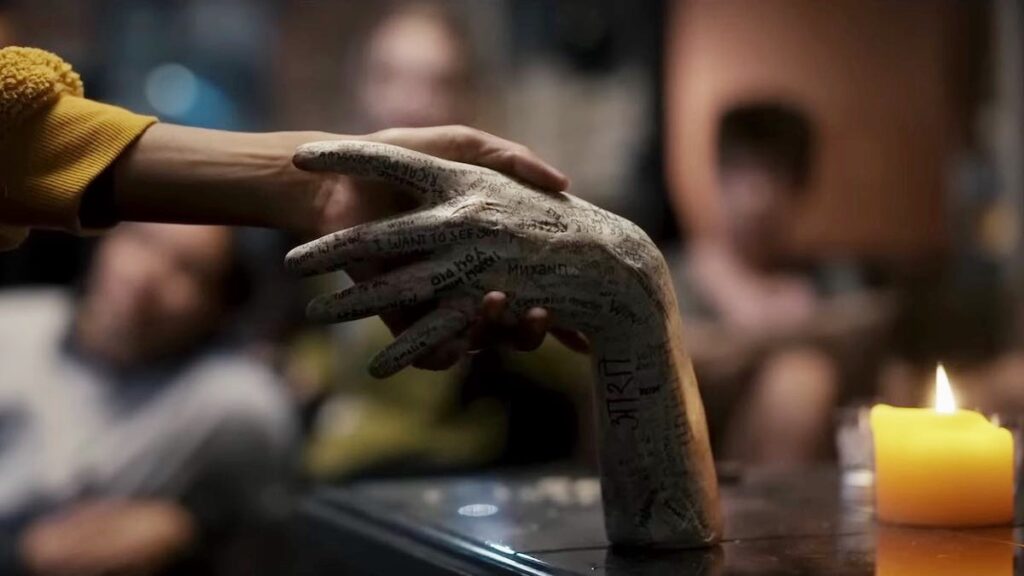
DP: Yes, even the things that were written on the hand were so specific. I remember someone saying it didn’t matter. And I said ‘It does matter! It needs to be something ancient. It does matter!’ It was very important for us to have something that had history, so when it happened onscreen you really would feel the presence of the hand.
Miranda Otto is terrific in the film, bringing real gravitas. Tell me a bit about working with her.
DP: Oh my God. It was amazing having her come onboard because it gave us the flexibility to cast other cast members that had not been in other things before. She gave us freedom, but we were also intimidated to direct her because it was Miranda Otto, and we had never directed a real actor. We were like, ‘Who the hell are we to direct Miranda Otto? My God!’ And it felt like it was intimidating. But then when we met her in person she was like a fun auntie. She was so easy to connect with and so warm and collaborative. I never felt like she was talking down to anyone. She was there to take part! Man, she is so cool.
MP: Yeah! There was a scene where she is interrogating everyone…
Isn’t that great?
DP: Yes, there are so many takes of that because we were all just laughing so hard…
MP: So hard!
Lastly, I need to ask you about working with Jennifer Kent on The Babadook.
DP: Yes! I was lucky enough to be production runner on that film when I was 19. She was the first director that I saw that cared about everything to do with the film. I was like, ‘This can’t be a bad movie because she cares so much about every single frame.’ We would do so many takes of just throwing a book down some stairs and stuff. I really admire that about her, to not sway from her vision. So on the weekends I would always offer to pick up Jennifer and Essie Davis and take them anywhere. I just wanted to help in any way that I could. So I really admired that about Jennifer Kent and enjoyed every second on that film; it was an energy that we wanted to take forward as well. We were like, ‘Let’s have that passion with everything we do so that when our name is attached to it that means something.’ When Jennifer Kent releases a movie you know that she’s not just doing this for whatever, but that she really cares about it. We love that.
Maybe you’ll have Essie Davis in one of your future movies, right?
MP: Oh yes! We would love to!
DP: Love to!
She was unforgettable in Nitram.
MP: Yes! How good was Nitram? So amazing!
DP: Just great! That’s a great film!
A masterwork.
This interview has been edited for clarity.
